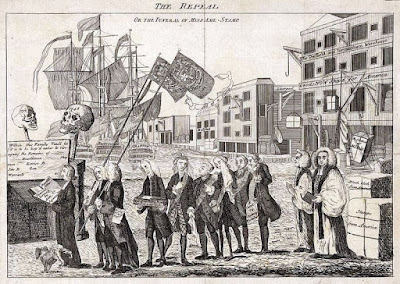March 18, 1766: British Parliament repeals the Stamp Act
With their victory in the Seven Years' War, Great Britain sought to recoup the debt accumulated from the war. Beginning in 1765, the British Parliament imposed a variety of taxes on their North American colonies (where the majority of the fighting took place). One of these taxes was the Stamp Act of 1765. The Stamp Act required that materials such as legal documents, postage, and even playing cards have a stamp on them indicating that payment had been made. The new tax effected many aspects of colonial life. Protest sprang up almost overnight.
Throughout 1765, the colonies erupted in protests from Georgia to Massachusetts. With the passage of the Sugar Act in 1764, the colonies established a system of communication in order to more readily protest these deplorable acts of Parliament. They created a Committee of Correspondence, in which letters, and instructions for protesting could be communicated throughout the colonies. Samuel Adams, a Massachusetts contributor to the Committee, began to stage street protests against the Stamp Act. The protests spread throughout the 13 colonies. In October in New York, the Stamp Act Congress was formed to create a resolution of repeal to be sent to the Parliament. Parliament debated the draft throughout the winter. In February of 1766, they voted to repeal the act in the wake of mounting pressure. The King gave his consent on March 18.
Throughout 1765, the colonies erupted in protests from Georgia to Massachusetts. With the passage of the Sugar Act in 1764, the colonies established a system of communication in order to more readily protest these deplorable acts of Parliament. They created a Committee of Correspondence, in which letters, and instructions for protesting could be communicated throughout the colonies. Samuel Adams, a Massachusetts contributor to the Committee, began to stage street protests against the Stamp Act. The protests spread throughout the 13 colonies. In October in New York, the Stamp Act Congress was formed to create a resolution of repeal to be sent to the Parliament. Parliament debated the draft throughout the winter. In February of 1766, they voted to repeal the act in the wake of mounting pressure. The King gave his consent on March 18.




Comments
Post a Comment